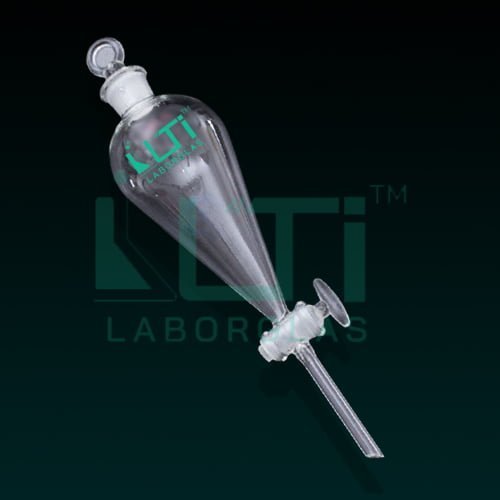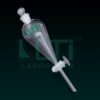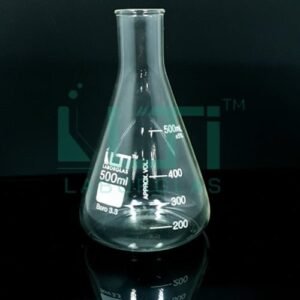- With Solid Glass Stopper & Glass Plug Stopcock
| PART No. | Capacity (ml) | Stopcock Bore (mm) | Stopper | PACK Qty. |
| 6820-30 | 30 | 2 | 13 | 1 |
| 6820-60 | 60 | 2 | 16 | 1 |
| 6820-125 | 125 | 2 | 22 | 1 |
| 6820-250 | 250 | 4 | 22 | 1 |
| 6820-500 | 500 | 4 | 27 | 1 |
| 6820-1000 | 1000 | 4 | 27 | 1 |
| 6820-2000 | 2000 | 6 | 38 | 1 |
| 6820-3000 | 3000 | 8 | 38 | 1 |
| 6820-4000 | 4000 | 8 | 38 | 1 |
| 6820-6000 | 6000 | 8 | 38 | 1 |
Here are some common uses of a Squibb Separating Funnel in the laboratory:
- Liquid-Liquid Extraction:
- The primary use of a Squibb Separating Funnel is for liquid-liquid extraction. It enables the separation of two immiscible liquids based on differences in density, solubility, or other properties.
- Chemical Analysis:
- Separating funnels are often used in chemical analysis, especially when isolating specific compounds from a mixture for further testing or characterization.
- Sample Preparation:
- In various analytical techniques, such as chromatography or spectroscopy, samples often need to be prepared by extracting or separating components. Squibb Separating Funnels aid in this sample preparation process.
- Purification Processes:
- Laboratories use separating funnels to purify substances by removing impurities or unwanted components through liquid-liquid extraction.
- Solvent Recovery:
- After a reaction or process, separating funnels can be used to recover solvents or valuable components by separating them from reaction mixtures.
- Phase Separation:
- Squibb Separating Funnels are essential for phase separation, ensuring that different layers (organic and aqueous, for example) can be cleanly and precisely separated.
- Fractionation:
- In processes where different components of a mixture need to be separated, fractionation using a Squibb Separating Funnel allows for the collection of distinct fractions.
- Removal of Impurities:
- Laboratories use separating funnels to remove impurities or unwanted substances from a reaction mixture or sample.
- Extraction of Biological Samples:
- In biological laboratories, separating funnels can be used for extracting specific compounds or substances from biological samples.
- Teaching and Demonstrations:
- Squibb Separating Funnels are often used in educational laboratories to teach students about liquid-liquid extraction techniques and the principles of phase separation.
- Quality Control:
- In industries where quality control is crucial, separating funnels may be used for extracting and isolating specific components for analysis.
- Research and Development:
- In research laboratories, separating funnels are used for various experiments and processes that involve the extraction or separation of substances.
- Environmental Testing:
- Laboratories involved in environmental testing may use Squibb Separating Funnels for extracting pollutants or specific compounds from environmental samples.







